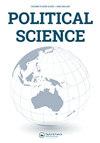Democratization in the Muslim World
IF 1.2
4区 社会学
Q3 POLITICAL SCIENCE
引用次数: 0
Abstract
The issue of the democratization of the Muslim world has puzzled scholarship since the end of the Cold War, when the third wave of democratization swept across the world but seemed to bypass most Muslim-majority countries, particularly the Arab world. Central to the debate about democratization in the Muslim world is the relationship between the Islamic religion and the political system supposedly bound up with it. As we will see, for some authors there is an inherent contradiction between the precepts of the Muslim faith and the requirements of democracy, while for others the two can be compatible or causally separated. When the debate on democratization is framed in these terms, it becomes very important to specify the definitions, issues, and processes investigated and evaluated to avoid confusion. When discussing processes of democratization—the move away from authoritarian practices to a political system based on political pluralism—there is a tendency in the literature to consider primarily the emergence of a very specific form of democracy: liberal democracy. There is therefore an important difference between democracy and democratization. Democratization is concerned with the introduction of democratic mechanisms and procedures and not necessarily with the granting of extensive liberal individual rights. One can then imagine a democratic political system where individual rights are limited and focus on the minimal requirements for equal political participation. Liberal democracy for its part is concerned with democratic political systems seeking to operationalize the progressive extension of different liberal individual rights. When this distinction is taken into account, it becomes easier to interpret and explain the changes—or absence thereof—occurring across the Muslim world. At this stage, a further distinction is necessary: the one between the Muslim world as a geographical area, in which people belonging to the Muslim faith are the majority or a very significant part of the population, and an Islamic system in which religious precepts actually organize social and political life. In this respect, one finds that a significant number of Muslim-majority countries can be labeled procedural democratic, while authoritarianism characterizes in fact the Arab world (with exceptions) and not the Muslim world per se, suggesting that there is nothing inherently antidemocratic in the Islamic religion. It should also then be noted that an Islamic system is actually in place in a very limited number of countries and that authoritarianism in Muslim and Arab countries is commonly not the product of the adoption of an Islamic system of government.穆斯林世界的民主化
自冷战结束以来,穆斯林世界的民主化问题一直困扰着学术界,当时第三波民主化浪潮席卷全球,但似乎绕过了大多数穆斯林占多数的国家,尤其是阿拉伯世界。关于穆斯林世界民主化的辩论的核心是伊斯兰宗教与据称与之紧密相连的政治制度之间的关系。正如我们将看到的,对一些作者来说,穆斯林信仰的戒律和民主的要求之间存在着内在的矛盾,而对另一些作者来说,两者可以兼容,也可以因果分离。当关于民主化的辩论以这些术语为框架时,明确定义、问题和调查和评估的过程以避免混淆就变得非常重要。在讨论民主化进程——从专制实践转向基于政治多元化的政治制度——时,文献中有一种倾向,主要考虑一种非常具体的民主形式的出现:自由民主。因此,民主和民主化之间有一个重要的区别。民主化涉及的是采用民主机制和程序,而不一定是给予广泛的自由的个人权利。然后,人们可以想象一个民主的政治制度,其中个人权利受到限制,并专注于平等政治参与的最低要求。自由民主就其本身而言,关注的是民主的政治制度,寻求使不同的自由主义个人权利的逐步扩展得以运作。当考虑到这一区别时,就更容易解释和解释穆斯林世界发生的变化——或者没有发生变化。在这个阶段,进一步的区分是必要的:穆斯林世界作为一个地理区域,其中属于穆斯林信仰的人占人口的大多数或非常重要的一部分,与伊斯兰制度之间的区分,其中宗教戒律实际上组织了社会和政治生活。在这方面,人们发现相当数量的穆斯林占多数的国家可以被贴上程序民主的标签,而威权主义实际上是阿拉伯世界的特征(除了例外),而不是穆斯林世界本身,这表明伊斯兰宗教中没有任何本质上的反民主。还应该指出的是,伊斯兰制度实际上在非常有限的几个国家实行,穆斯林和阿拉伯国家的威权主义通常不是采用伊斯兰政府制度的产物。
本文章由计算机程序翻译,如有差异,请以英文原文为准。
求助全文
约1分钟内获得全文
求助全文
来源期刊

Political Science
POLITICAL SCIENCE-
CiteScore
0.90
自引率
0.00%
发文量
13
期刊介绍:
Political Science publishes high quality original scholarly works in the broad field of political science. Submission of articles with a regional focus on New Zealand and the Asia-Pacific is particularly encouraged, but content is not limited to this focus. Contributions are invited from across the political science discipline, including from the fields of international relations, comparative politics, political theory and public administration. Proposals for collections of articles on a common theme or debate to be published as special issues are welcome, as well as individual submissions.
 求助内容:
求助内容: 应助结果提醒方式:
应助结果提醒方式:


